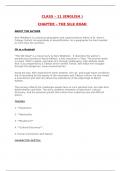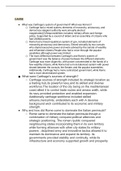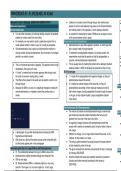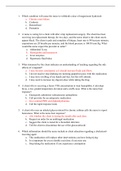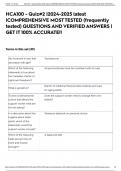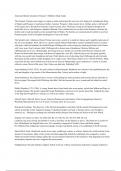Organisations & Society - Assignment 5
Assignment 5.1
The goals and mission of New Belgium Brewing
New Belgium Brewing (NBB) is a growing Belgium beer brewery, which is dedicated to
making beer but also promotes and support the environment, its employees and of course its
customers. Therefore, their mission statement is: “To operate a profitable brewery which
makes our love and talent manifest.” (Ferrell, 2006. P2).
So, more explicitly, the NBB tries to produce a high quality, world-class, beer, while at the
same time, being environmentally friendly. But the NBB is not just environmentally friendly,
it also tries to improve the environment, for example by donating money to charity, investing
in new technologies, recycling of resources, sponsorships etc.
In short, the NBB has a strong corporate image, which consists of making a (long-term)
profit, while at the same time improving and caring about the environment.
To reach this mission and goals, there are numerous examples given in the case, such as the
following one: ‘They do this by continually trying to reduce the number of resources they use
as well as investing in efficient technology and reusing resources and recycling wherever
possible.’ (Ferrell, 2006. P4).
Besides the environment, NBB also cares for its employees, that possess one-third of the
stocks, and the social community. Therefore, NBB also got a philanthropy committee and a
community bulletin board
But why are those goals and mission chosen? To explain this, one can come up with several
reasons, which are also mentioned in the case.
As mentioned before, NBB really focusses on the ethical culture of the brand, because they
believe that the mandate for CSR gains momentum beyond the courtroom to the more
powerful market, where the beer eventually is sold. In other words, NBB uses or can use, the
image that is created as a competitive advantage and/or to attract customers. This, however, is
not the main reason.
, The culture at NBB is about environmental responsivity, but also about striving for
sustainable growth and the achievement of economic goals. All this while reaching the
present need, but without destroying the opportunities for the next generations (Ferrell, 2006).
At last, and most the obvious reason is that at NBB they just love, and are passioned about,
making high-quality beer, while at the same time caring for the society and the earth. By
empowering everyone within the company, an environment is created in which everyone has
a desire for success regarding the business’ goals and mission.
To conclude, NBB defined itself as more than just a beer brewery, they also see themselves as
an organization that cares about and is concerned with all the stakeholders (Ferrell, 2006).
Be now, it may be clear that NBB is using a quite unique CSR strategy. This strategy can be
explained by using a 2x2 matrix, which distinguishes an instrumental and responsible mode of
incorporation. Furthermore, this can be beyond rules and programmes or just ‘’of’’ rules and
programmes.
If this matrix is applied to the case of NBB, one can state that the CSR strategy of NBB fits
with the responsible (integrity) mode of incorporation and going beyond rules and
programmes.
At first, it is obvious that NBB is caring about the environment, investing state of art
technologies and procedures, independent of their (economic goals). They are doing it
because caring about their employees, the society and the environment in just the right thing
to do, according to NBB.
This can be seen in the following quote: ‘’The new construction will continue to be efficient,
high tech and environmentally friendly. By choosing efficiency and renewable energy as well
as focusing on quality NBB has been able to expand successfully’’ (Ferrell, 2006).
Secondly, NBB is implementing methods, techniques, and technology that goes far beyond
the legal requirements. This is the case because in NBB states that they are implementing and
using techniques that are beyond the legal requirements. They state that they feel the need to
set stricter limits and goals, even if they comply with the current legal requirements.
While doing this, they are not only concerned with their own goals, but with the desire to
create a healthy environment and a living, learning community (Ferrell, 2006).
Assignment 5.1
The goals and mission of New Belgium Brewing
New Belgium Brewing (NBB) is a growing Belgium beer brewery, which is dedicated to
making beer but also promotes and support the environment, its employees and of course its
customers. Therefore, their mission statement is: “To operate a profitable brewery which
makes our love and talent manifest.” (Ferrell, 2006. P2).
So, more explicitly, the NBB tries to produce a high quality, world-class, beer, while at the
same time, being environmentally friendly. But the NBB is not just environmentally friendly,
it also tries to improve the environment, for example by donating money to charity, investing
in new technologies, recycling of resources, sponsorships etc.
In short, the NBB has a strong corporate image, which consists of making a (long-term)
profit, while at the same time improving and caring about the environment.
To reach this mission and goals, there are numerous examples given in the case, such as the
following one: ‘They do this by continually trying to reduce the number of resources they use
as well as investing in efficient technology and reusing resources and recycling wherever
possible.’ (Ferrell, 2006. P4).
Besides the environment, NBB also cares for its employees, that possess one-third of the
stocks, and the social community. Therefore, NBB also got a philanthropy committee and a
community bulletin board
But why are those goals and mission chosen? To explain this, one can come up with several
reasons, which are also mentioned in the case.
As mentioned before, NBB really focusses on the ethical culture of the brand, because they
believe that the mandate for CSR gains momentum beyond the courtroom to the more
powerful market, where the beer eventually is sold. In other words, NBB uses or can use, the
image that is created as a competitive advantage and/or to attract customers. This, however, is
not the main reason.
, The culture at NBB is about environmental responsivity, but also about striving for
sustainable growth and the achievement of economic goals. All this while reaching the
present need, but without destroying the opportunities for the next generations (Ferrell, 2006).
At last, and most the obvious reason is that at NBB they just love, and are passioned about,
making high-quality beer, while at the same time caring for the society and the earth. By
empowering everyone within the company, an environment is created in which everyone has
a desire for success regarding the business’ goals and mission.
To conclude, NBB defined itself as more than just a beer brewery, they also see themselves as
an organization that cares about and is concerned with all the stakeholders (Ferrell, 2006).
Be now, it may be clear that NBB is using a quite unique CSR strategy. This strategy can be
explained by using a 2x2 matrix, which distinguishes an instrumental and responsible mode of
incorporation. Furthermore, this can be beyond rules and programmes or just ‘’of’’ rules and
programmes.
If this matrix is applied to the case of NBB, one can state that the CSR strategy of NBB fits
with the responsible (integrity) mode of incorporation and going beyond rules and
programmes.
At first, it is obvious that NBB is caring about the environment, investing state of art
technologies and procedures, independent of their (economic goals). They are doing it
because caring about their employees, the society and the environment in just the right thing
to do, according to NBB.
This can be seen in the following quote: ‘’The new construction will continue to be efficient,
high tech and environmentally friendly. By choosing efficiency and renewable energy as well
as focusing on quality NBB has been able to expand successfully’’ (Ferrell, 2006).
Secondly, NBB is implementing methods, techniques, and technology that goes far beyond
the legal requirements. This is the case because in NBB states that they are implementing and
using techniques that are beyond the legal requirements. They state that they feel the need to
set stricter limits and goals, even if they comply with the current legal requirements.
While doing this, they are not only concerned with their own goals, but with the desire to
create a healthy environment and a living, learning community (Ferrell, 2006).


